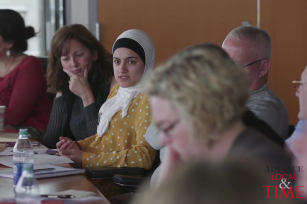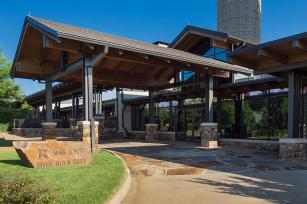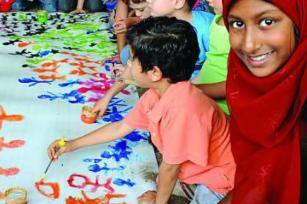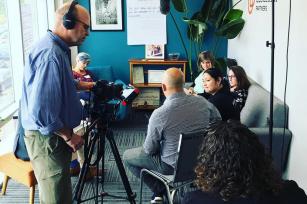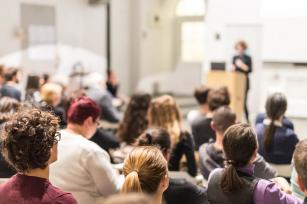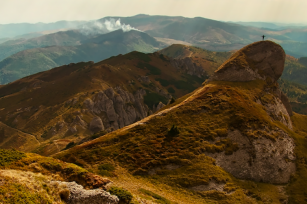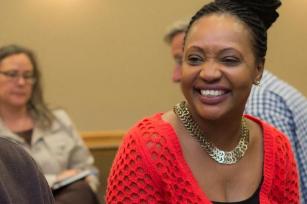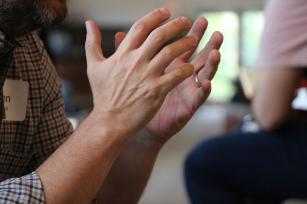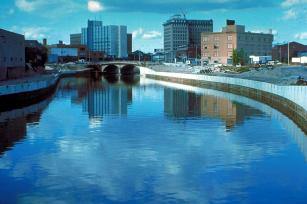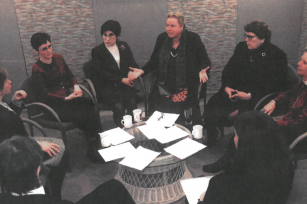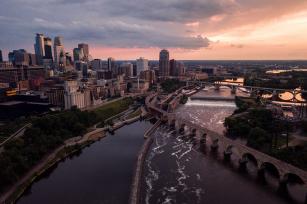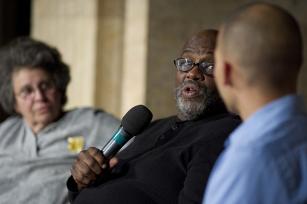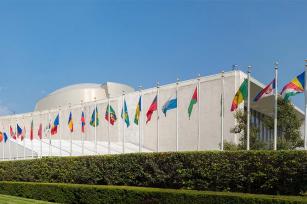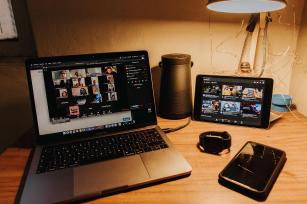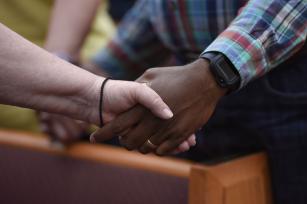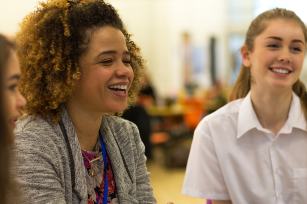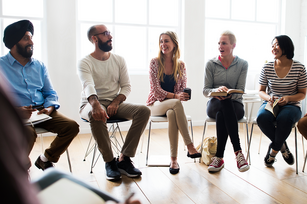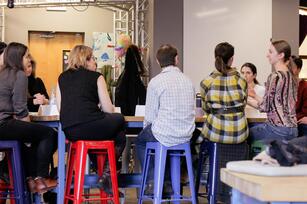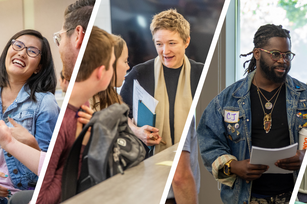
Breadcrumb
- Essential Partners
- Our Impact
- Impact Stories
- Building Local Capacity in Gloucester, MA
Building Local Capacity in Gloucester, MA
Gloucester is a diverse coastal community on Massachusetts’ North Shore, known for traditions of shipbuilding, fishing, art, and summer retreats from the city. Connected by the commuter rail to Boston, the city has an increasing number of professionals making the daily trip to the city to work.
The city has very distinct neighborhoods, including urban working-class areas, a working industrial waterfront, quaint outlying communities, an art colony, and a piece of New England’s “gold coast.” Politically, the city could not be more diverse, with almost 60% of its inhabitants not affiliated with either major party.
In recent years, like many coastal communities renegotiating their identities amidst economic and demographic shifts, Gloucester has been challenged to bring longtime residents, some of whom have lived in the city for generations, and newer arrivals into a single community.
Underlying tensions are exposed often: every time the city looks to decide how to use newly acquired property, whether to invest in a new school or to erect a monument or piece of public art.
Building Local Capacity
A group of five Gloucester residents, including Essential Partners' own John Sarrouf, gathered to discuss what they could do to foster a more constructive culture of dialogue in the city.
The group launched two cornerstone initiatives that would become the foundations for Gloucester Conversations (GC), an ongoing citywide dialogue project, designed to help the city discuss tense or contentious issues.
First, the group hosted small dialogues for people to tell their stories and express their hopes for the city. These Kitchen Table Conversations gave neighbors a framework to gather for a deeper kind of conversation in their home and discuss what was most important to their collective future. In addition to discussing specific issues, participants reflected on the process of conversation itself, and how dialogue can make a place for everyone.
The second initiative was training a cadre of facilitators who could lead small group conversations within larger community dialogues. GC shared its vision with leaders in government, journalism, education, arts and culture, asking for and offering their support, outreach which was exceedingly well-received.
When tensions escalated over the placement of a donated piece of public art, city leaders asked Gloucester Conversations to help guide the conversation around developing a public art policy.
Public Art, Homelessness, Libraries, and More
Gloucester Conversations designed and facilitated a dialogue session for arts and cultural leaders, and later, a successful open community meeting. Rather than debate the merits of the particular piece of art, GC invited a conversation about what Gloucester wanted in its public art, and how to think together beyond a single sculpture and placement—about what the community cares about and how it will approach decision-making.
The conversation contributed to a public art policy written by the Committee for the Arts. In addition, GC is now organizing community meetings in each ward of the city to gather public input on that policy and other arts initiatives.
Since then, Gloucester Conversations facilitators have helped the community:
- Resolve tensions between representatives of a day-center for homeless individuals and its neighbors, leading to the discovery of common ground, collaborative problem-solving, and a plan for ongoing communication
- Support conversations about education and converting school libraries into ‘learning commons”
- Facilitate public conversations about the “Massachusetts Ocean Plan”
- Create a study circle about what to do with an abandoned school
The vision is of a Gloucester with the capacity to take on all of the big issues that it faces, together, and with more of its voices heard. Neighbors can speak to neighbors about even the most difficult decisions with civility and care.
Trained facilitators can invite the meaningful conversations that everybody wants to have, and the city’s future reflects the broad interests and hopes that make up the community.
Related Impact Stories
Testimonials

Program ParticipantI read this comment from the 14th Dalai Lama: "Every change of mind is first of all a change of heart.” It seems appropriate for what we are doing.
Bayview, Michigan

Program ParticipantI am now open to new views and can moderate my impulse to debate or persuade others of different views
Montana

Kim Davidson, OmbudsI’ve gained not only confidence but tools. The Essential Partners training was worth every penny.
Oberlin College, Ohio

Anjali Bal, Associate Professor of MarketingOne of the things that we talked about was the ability to hear another person’s point of view, even if our minds aren’t changed. We have to remember that any sort of movement is movement. If we don’t acknowledge small movement, then we just stay on two different sides, and it’s all black and white, and we don’t hear each other.
Babson College, MA

Linda Gryczan, MediatorInstead of demonizing and dehumanizing the other, we built a deeper connection. The fact that we disagree matters much less. It matters much more that we are neighbors in this community.
Montana Mediation Association

Belle AbayaTogether, we married our ideas to create a dialogue model that took into consideration our young people’s particular needs, and our culture.
The Conflict Resolution Group Foundation, Philippines

Bill Scott, Project DirectorThere was a remarkable change in the way we were able to communicate with one another following the facilitated conversations.
Massachusetts Department of Mental Health

Undergraduate StudentI notice that my classmates take much more care when speaking about people who practice other religions. They make fewer assumptions, and they’re more careful with their words to make sure to avoid unintentional connotations.
Bridgewater College, Virginia
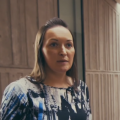
Louise O’Kane, Community Places[Essential Partners’] technique is used to explore contentious or divisive issues. So looking at renewable energy we thought this was an ideal opportunity to explore all the complexities of that issue. I found it a really useful method, and although this is the first time we’ve used it I am sure we’ll be using it again.
Northern Ireland, UK

Program ParticipantI felt an amazing sense of accomplishment when the Essential Partners training ended; that I'd done something important for my community and something important for me.
Massachusetts

Romeo McCauley, Project PartnerI learned that I can build relationships, that I can be connected to anybody who I want to be connected to, no matter how difficult it is
Liberia

Bob Bordone, Expert and AuthorEssential Partners does the best work in the field of dialogue and communication.
Harvard Negotiation & Mediation Clinical Program, Co-Founder

Matthew Sandikie, Project PartnerThis has been quite different from other discussions in Liberia about peace. While many processes have been about how to reform ex-combatants, this was about how we may hold our own views but live together peacefully.
Liberia

Program ParticipantThis is the best adult learning experience I have had in the past five years. I wanted to learn new skills—I did!

Program ParticipantThis is a new idea, so many people speaking from their hearts. People can come together...if people can understand, they can change their hearts; then this can bring about more change.
Interfaith Mediation Centre, Nigeria

Belle AbayaWhat is special about Essential Partners' approach is that it promotes authenticity, reduces defensiveness, increases curiosity, and boosts connectedness.
The Conflict Resolution Group Foundation, Philippines

Veronique Cavaillier, Director of Eastern Trade CouncilI think Essential Partners' training should be mandatory in every legislature. I think it should be a requirement.
The Council of State Governments

Belle AbayaAuthentic conversations will lead people to reflect on their own thinking and transform their perspectives to include that of others.
The Conflict Resolution Group Foundation, Philippines

Program ParticipantThis is a different tool for engagement. It’s not about you, it’s about others. It involves the art of listening and sincerely talking from the heart
Interfaith Mediation Centre, Nigeria

Andrew Wulf, PrincipalThe community dialogue was instrumental in helping us create a new policy around class rank. Though a controversial topic in the community, the dialogue EP helped us run ensured all voices were heard and valued. Regardless of how people felt with the final result, one parent summed it up best for us, ‘sometimes the process is more important than the outcome’.
Newburyport High School

Meirav Solomon ’20Dialogue not only teaches you how to interact and understand more deeply those around you, it also teaches you more about the world around you and yourself. I think dialogue is super important to my growth as a student, a global citizen and a human being. I have learned to listen, I have learned to speak out, I have learned how to access my stretch zone (where I feel uncomfortable speaking but not turned off) and I have learned where my limits are.
Cary Academy, NC

Kate CellThe thing that always feels like magic to me—and I’ve used it in several meetings that I’ve had since—is how the practitioners start by setting out pacts or agreements.
Union of Concerned Scientists, Massachusetts

Cricket Fuller, The Christian Science MonitorThis wasn’t a policy debate [about guns]. Instead, two people whose backgrounds and views diverged in almost every way possible shared a moment of honesty that struck at the heart of the matter.
Boston, Massachusetts

Windor DorkoAs a former rebel, I really believe that if we had known about dialogue, perhaps we would not have had a civil war.
Liberia

Janet Harris, Winthrop Rockefeller InstituteThe learning we received from Essential Partners has helped us open up space for people to have difficult conversations in a different way. The more we do this, the more we realize that dialogue has to be a part of all our work.
Arkansas

Undergraduate StudentI have never heard people talk so openly about race, especially in a class setting. Everyone was respectful and honest at the same time. The dialogue structure helped me learn about my peers and helped me feel more comfortable than I ever have about discussing controversial issues.
Gordon College, Massachusetts

Seth Karamage, MediatorI am amazed at what came out—the way people shared their stories. This is not like a role-play; it really touched me.
Interfaith Mediation Centre, Nigeria

Misty Stoll, School Board TrusteeThe Sheridan Community has changed in the best way since the Essential Partners training. The Center for a Vital Community has been holding monthly dialogues. I’m going to facilitate the upcoming one. What’s great is that we’re attracting a much more diverse group of participants. There are always the regulars who come, but now we’re also getting conservative Republicans to come as well—politicians come, even the Sheriff comes.
Wyoming

Misty Stoll, School Board TrusteeI ran for my local school board in 2018 and was elected. I use the skills in our meetings, whether I’m chairing the meeting or not. This makes the meetings much more productive. We don’t go over the same topics over and over again.
Wyoming

Rebekah Shrestha, SVPEssential Partners has played a catalytic role in our ability to facilitate dialogue time and time again, and we could not have done this work without them.
Belfer Center for Innovation & Social Impact and Office of Strategic Planning, 92NY

Etionette Nshirmirimana, Burundian Master TrainerI realized that by using the “dialogue” approach, people could talk of what is deep in their heart, especially things that have harmed them.
Burundi

Imam Sani IsahThrough this training, we will have more people in the stream of work that we do and become better equipped with the know-how, skills and techniques. But most important, together we will sow a seed that will germinate and become a source of the antidote to terrorism, fanaticism, bigotry and extremism.
Nigeria

Program ParticipantThe highlight for me was the interconnectedness of the participants’ views, mutual respect, and range of experiences within the group
Montana

Nicki Glasser, Policy CoordinatorWhat surprised me was how much you could transform a relationship during a three-hour conversation.
Transformation Center, Massachusetts

Program ParticipantI did not anticipate having as many concrete takeaways as I do. I feel there is an immense practical application.

Program ParticipantBefore, I thought all dialogue that does not culminate in solution was considered equivalent to failure. Now I see that dialogue is a stage complete in itself.
Burundi

Janele Nelson, Mission DirectorIn these divisive times, Essential Partners has given my local YMCA and now the national YMCA a means to build bridges through dialogue, re-establishing foundations for constructive change to occur.
YMCA of Pierce & Kitsap Counties (WA)

Peter Cooke, Immigration Dialogue ParticipantThere’s a real difference to people who are coming to meetings. They say, wow this is so different. They all said how people were more on the ball, more congenial. Now people see growing the economy as a way to unify the receiving community and immigrant communities.
New Hampshire

Douglas Stone, Sheila Heen, and Bruce PattonWe owe a debt of gratitude to Laura Chasin and her collaborators at Essential Partners… From them, we have learned about the transformative power of telling one’s story and speaking to the heart of the matter.
Difficult Conversations
